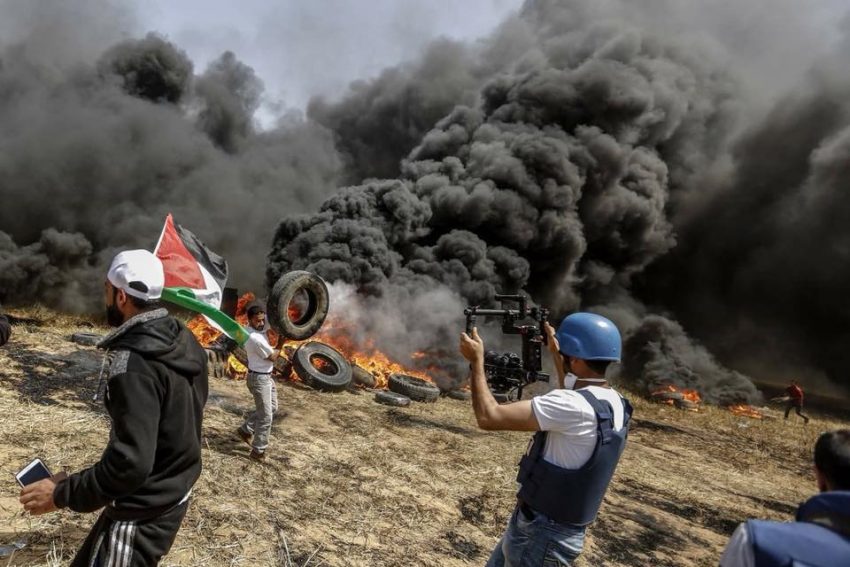Help Egypt Help Israel On Middle East Peace
Posted on

Hamas protests in Gaza 2018
As the Trump Administration tries to force Palestinians to the bargaining table by cutting funding to the UN relief agency that serves them, closes the PLO’s offices here and continues to tout its forthcoming “deal of the century,” few in national security circles are discussing the chances of Peace in the Middle East. In this piece by an advisor to the Jewish Institute for National Security of America (JINSA), Kenneth Glueck discusses what may be the key role of Egypt in the coming months.
Peace in the Middle East seems elusive as ever. Yet, even as the future of its own commitments to the region remains uncertain, the United States has a decided interest to prevent conflict from spreading to its key ally, Israel. That requires supporting Egypt’s pivotal, intertwined roles of diplomatic mediator and counterterrorism partner in the region.

Kenneth Glueck
Currently, Gaza poses the greatest threat of rapid escalation on any of Israel’s borders. Sporadic violence has been ongoing since Hamas exploited protests in March to attack Israeli soldiers. Since then, the terrorist organization that rules Gaza has continued exploiting protests to charge the border, while also decimating the southern Israeli countryside with incendiary kites and balloons and repeatedly lobbing rockets into Israel.
This violence must be halted before it spirals into another war. Any attempt at peace will require Egypt’s involvement. Indeed, Cairo already is mediating between the two sides and has engineered several short cease-fires. It can, and must, do more, with Washington’s support.
As part of its effort to secure peace, Cairo has sought to deter Hamas aggression and curb its military power. Since Hamas seized Gaza in 2007, Egypt has acted in parallel with Israel to enforce a blockade against the terrorist group. After successfully helping end the 2014 conflict, Egypt sought to isolate Hamas and prevent its rearmament, expanding its buffer zone along the Egypt-Gaza border and destroying more than 1,000 tunnels for smuggling weapons and money. At the same time, Cairo was committed to helping the people of Gaza suffering under Hamas rule, raising $4 billion from international donors for postwar reconstruction.
Given this successful record, U.S. policymakers should vocally endorse Egypt as a peace broker between Israel and Hamas and be prepared to support negotiations under its auspices. By the same token, the United States must support Egypt as a counterterrorism partner not only in Gaza but against ISIS in neighboring Sinai.
I traveled to Egypt recently as part of a delegation sponsored by the Jewish Institute for National Security of America (JINSA). We met with Egypt’s President Abdel el-Sisi, Defense Minister General Mohamed Ahmed Zaki and Foreign Minister Sameh Shoukry. They emphasized Egypt’s critical role in maintaining and achieving regional stability and their readiness to continue that role. They also highlighted the importance of a strong bond with the United States and their desire to strengthen that bond.
Indeed, for decades Egypt has committed to fostering a broader Israel-Palestinian peace, including brokering ceasefires in recent conflicts between Israel and Hamas. Especially after the disastrous pro-Hamas policies of President Mohamed Morsi, Egypt under President Sisi has also played a crucial role in helping to isolate and pressure Hamas.
Egyptian mediation was critical to ending the 2014 Gaza War, one of the longest in Israeli history. Very early in that conflict, an Egyptian ceasefire proposal was accepted by both sides, with hostilities even being suspended temporarily, but ultimately Hamas reneged on the ceasefire. As American policymakers spent succeeding weeks criticizing Israel’s conduct, Cairo was busy working with Israeli and Palestinian officials on a long-term solution. Essentially an identical ceasefire deal ended the conflict in August, after seven weeks of further fighting. As an anonymous Israeli government official stated at the time, “Israel has accepted an Egyptian proposal for a complete and unlimited-in-time ceasefire.” That held for nearly four years, the longest period of peace on Israel’s southern border in decades.
Already, Egypt has shown it can seek a longer-term arrangement to exchange quiet for quiet in Gaza. As violence flared up this spring, pressure from Cairo helped convince Hamas to curb its deadly “peaceful protests.” When Hamas recently launched incendiary kites and balloons, Egypt’s ultimatum helped defuse tensions. Cairo has also helped deter Hamas by communicating Israel’s intent to escalate hostilities if Hamas continued firing on the IDF and into Israel.
Now, Egypt is diligently trying for an even more ambitious goal: negotiating a 5-plus-year ceasefire – including prisoner exchanges and reconstruction programs – and having the Palestinian Authority assume control of Gaza under Egyptian auspices. The efficacy of these Egyptian efforts can only be increased if both sides know Cairo enjoys Washington’s full confidence.
Egypt needs U.S. support for its attempts to build peace at home. Since the November 2017 mosque attack by ISIS in Sinai that killed over 300 civilians, Egypt has stepped up its own counterterrorism efforts. Success is critical to the security of Egypt’s 80 million citizens and for peace in Gaza; restoring order to Sinai will help compel Hamas to distance itself further from ISIS. The recent decision to authorize the release of $1.2 billion in US military assistance (Foreign Military Financing) is a step in the right direction toward ensuring peace.
Often unappreciated, Egypt’s efforts to maintain regional stability and its commitment to countering Islamist extremism should be fully recognized and reinforced by American policymakers.
Kenneth Glueck is former commander of Marine Corps Combat Development Command. A member of the Jewish Institute for National Security of America’s (JINSA) Board of Advisors, he was a member of a recent JINSA delegation to assess U.S. policy toward Egypt and provide recommendations to American policymakers.
Subscribe to our newsletter
Promotions, new products and sales. Directly to your inbox.
